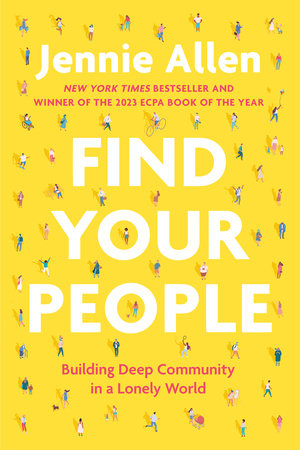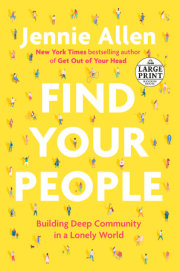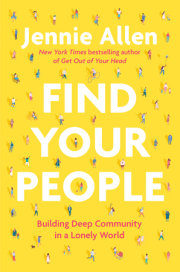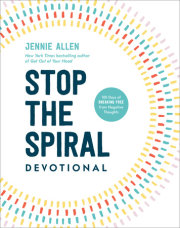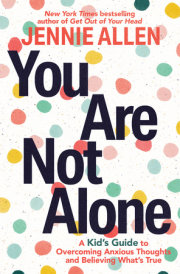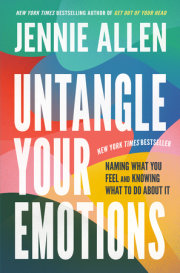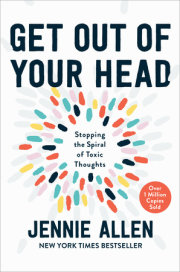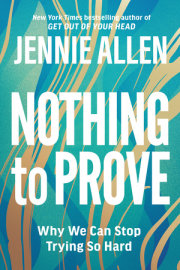1.
There Is Another WayDo you believe that you were built for true, radical connection? Even if you’re an introvert, we all are physically, emotionally, and spiritually hardwired by God for relationship. From the moment you were born until you take your last breath, deep, authentic connection is the thing your soul most craves. Not just as an occasional experience, but as a reality woven into every day of your life.
But to access this reality, you’ll have to make some changes. Because something is fundamentally wrong with how we have built our lives.
We spend our evenings and weekends tucked into our little residences with our little family or our roommates or alone, staring at our little screens. We make dinner for just us and never want to trouble our neighbors for anything. We fill a small, little crevice called home with everything we could possibly need, we keep our doors locked tight, and we feel all safe and sound. But we’ve completely cut ourselves off from people outside our little self-protective world. We may feel comfortable and safe and independent and entertained.
But also we feel completely sad.
Nearly all of us live this way, and yet it’s just not working for any of us. As I mentioned, research says that more than three in five Americans report being chronically lonely, and that number is “on the rise.” These stats are indicators of a grave and costly crisis. Anxiety, depression, suicidal thoughts are all on the rise. Scientists now warn that loneliness is worse for our health than obesity, smoking, lack of access to health care, and physical inactivity.
So why are we letting it define our days?
Is this living? Is this how life is supposed to go?
Let me skip to the answer: No. It isn’t supposed to be this way! You know what you were actually built for?
•Long, meaningful conversations with people who have known you for years and would donate their kidney if you needed it.
•People who drop by with pizza and paper plates unannounced because they missed you and aren’t afraid to intrude.
•Regular unscheduled and unhurried time with people who feel like family, even if they aren’t.
•The obvious few who scream with joy when you share your awesome news and cry with you when you share your hard stuff.
•People who show up early to help you cook and stay late to clean up.
•People who hurt you and who are hurt by you, but who choose to work through it with you instead of both of you quitting on each other.
•People who live on mission beside you, who challenge you and make you better.
•People who know they are your people, and you are theirs. People who belong to each other.
This is a book about how to find our people—the ones we’ll live day in and day out with, the ones we’ll risk being fully known by, the ones we’ll gladly be inconvenienced by, the ones we will choose to love.
Yes, I know how complicated and exhausting making friends can be as an adult. Why didn’t anyone teach us how to do this? Does it really have to be this hard? What are we missing?
I begin this journey with you aware of two things:
1. People make up the best parts of life.
2. People make up the most painful parts of life.
And I assume you picked up this book with one of those two truths more prominently fixed in your mind. So, whether you come with hopes or with fears or with both, it’s okay. I suspect that if you really go all in with me, some of your fears may come true. But I also believe that your hopes will be exceeded.
It is possible to live connected—intimately connected—to other people.
But connection costs something, more than many are willing to pay.
If you choose to join me in this adventure of building authentic community, I promise that what you’ll gain in the bargain is more than worth it, but it will require you to reconsider most everything in your life today. Specifically:
•Your daily and weekly routines.
•The way that you buy groceries.
•The new neighborhood you’re considering.
•Whether or not you live near your family.
•The church you choose to be part of.
•What you do this weekend.
•And deeper still: how open you choose to be about your difficult marriage.
•And about your fight with anxiety, which is getting worse.
•And whether you’ll ask the hard question of the person you love who is drinking too much.
•And if you’ll forgive and fight for the people who have hurt you deeper than you could ever imagine.
Everything I’ll be asking of you in our journey together requires that you risk your comfort and your routines. And yet everything in your life aches for the change I am inviting you to experience. Because I am convinced that we have been going about this all wrong.
Waiting for ConnectionI still remember the day when the thought occurred to me that I didn’t have any friends. I should clarify: I had plenty of friends, but those friends and I all had very full lives, which meant that our interactions were erratic—and rare. Back then, I was neck deep in parenting young kids as well as traveling a lot, speaking, and doing events with IF:Gathering, the ministry organization I lead. And while being on the road provided plenty of life-giving interactions with other women, reentry at home often came with a sting. Did any of my “friends” even realize I’d been gone? Did they know that I’d returned?
This was not my friends’ fault, of course. They had obligations, commitments, relationships, and jobs of their own. In fact, they likely were asking the same questions about me: “Does Jennie know what’s going on in my life? Does she even care?”
Isn’t this familiar? We’re all just kind of waiting for connection to find us. We’re waiting for someone else to initiate. Someone else to be there for us. Someone else to make the plans or ask the perfectly crafted question that helps us bare our souls.
Here’s what we do: We spend hours alone in our crowded, noisy, screen-lit worlds, we invest only sporadic time with acquaintances, and then we expect close friends to somehow appear in our busy lives. We think our acquaintances should just magically produce two to five BFFs. Then, we believe, our relational needs will be met.
But community is bigger than two or three friends. Community should be the way we live. Historically and practically, people in all countries and generations have found their friends from their larger village of interconnected people.
I’ve been nerding out researching this, and here’s what I’ve learned: there are scientific studies that show how many relationships we can manage and how we socially interact with people. Basically, we can handle a network of only about 150 people. Think of your Christmas list. People you talk to at least once or twice a year. Much more than that and it falls apart!
Inside that 150 are layers of friendship that deepen with how much time you spend with a person and the degree of your relationship with them. Research suggests that we can handle only fifty people in what we will call our acquaintances. Within those fifty people, there are fifteen people in our village. And within our village, we have a capacity to make five of them our BFFs. You read that right. Only five!
Extroverts may have slightly more capacity than five, but you get the picture.
How much time you spend face to face with a person is what determines where they fit in your 150. And what pushes people deeper into our inner circles of friends?
The amount of time we spend with them.
Time.
It is our best asset when it comes to building deep community.
So, as we begin, I want you to open your mind to something more than that handful of friends you’ve been picturing as your goal. My dream for you, God’s plan for you, is to build a culture of community in every part of your life.
My friend Curt, the neurorelational expert, said it this way: “Every newborn comes into this world looking for someone looking for her.” And that never quits being true.
You and I are both a little needy.
In fact, God built us this way.
And yet it’s hard to need people. No, it’s terrifying to need people, because sometimes when we acknowledge our need, we feel like there is no one who wants to take our call in the middle of the mess. Or at least that’s what I believe in the moment.
Copyright © 2022 by Jennie Allen. All rights reserved. No part of this excerpt may be reproduced or reprinted without permission in writing from the publisher.





